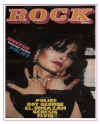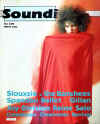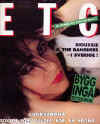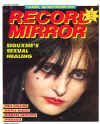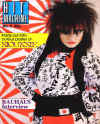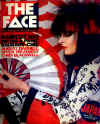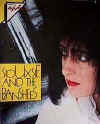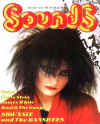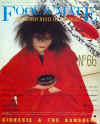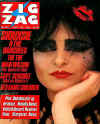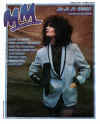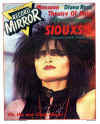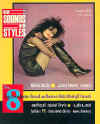|
|
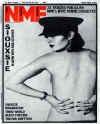 BEAUTlFUL
BUT BRIEF, the Japanese cherry blossom trees are in bloom for only two
weeks of the year. And, with that quietly impeccable politeness for
which their country is rightly renowned, this year's blossoms have timed
their splendour precisely, to coincide exactly with the first visit to
these shores of one Siouxsie Sioux, and her Banshees three. And me. BEAUTlFUL
BUT BRIEF, the Japanese cherry blossom trees are in bloom for only two
weeks of the year. And, with that quietly impeccable politeness for
which their country is rightly renowned, this year's blossoms have timed
their splendour precisely, to coincide exactly with the first visit to
these shores of one Siouxsie Sioux, and her Banshees three. And me.
Arriving with a weirdly mysterious reputation before
them -- "we thought of them as the group from the dark side of the
moon" as one girl put it to me -- Siouxsie And The Banshees
appeared on stage four times, and answered 3000 interview questions,
signed a million autographs (it seemed), and posed for enough fans'
camera-snaps to reach all the way home to London.
And more than that, in their short stay, I saw and
felt them make that electric pop contact: the magical instinctive link
which we grow old, or too cool, to forget about, or bury under too much
needless theorising.
Their audience was young, and very largely female, and
beneath its native restraint it tingled with fresh naive excitement. Let
me remember.
The first show was in a little club in a big neon-lit
city. I arrived five minutes before the start (and travelling from
Tooting to Tokyo, that was pretty neat timing, I thought) and found
myself in an atmosphere charged with a delicious tension. The instant
reminiscence was of the 100 Club, summer '76 -- I know that if everyone
who says they were at those Pistols gigs really did go, then the
audience would have resembled some '70s version of the 'Sergeant Pepper'
cover, but I was there -- the same strange silence, the un-complacent
anticipation, the wondrous sense of "what the hell's about to
happen in this small and crowded room?"...
The club date, and the big concert shows which
followed it, were successes on every level, tempting the Banshees' camp
to speculate that Japan might become the first country outside Britain
where the group make a large and lasting impact. The tour is short -- in
keeping with their resolve that each appearance be a special event,
instead of one more stop on a grinding schedule -- and it's run with the
brisk efficiency the Japanese apply to any enterprise. (Financial help
comes via a sponsorship deal with Yamaha). A band member confides how
it's useful the way local laws keep the road-crew away from drugs -- and
the roadies, meanwhile, say much the same about the group. Either way,
morale is high.
Row on row of well-scrubbed. open-mouthed oriental
faces stare up, enchanted by the onstage spectacle the Banshees present
-- Siouxsie moving, superbly-dressed, commanding and prancing like some
particularly malicious goblin; the still sentinels of Steven Severin and
John McGeoch flanking her at either side; and behind, head down, drummer
Budgie's blond muppet mop flopping. Given the obvious lyric/language
barrier, visual image is inevitably crucial to the Japanese consumer.
But as a total show, the Banshees and their music do communicate more
than fashion and glamour.
I understood more about the group, too. Always an
admirer of theirs, more especially of the new era, 'JuJu' incarnation, I
couldn't pretend to be "a fan" pure and simple. But getting
away from England, with its inescapable preconceptions, I got a
refreshing reminder of what the group would really mean to a fan. You
drop all the conceptual luggage, all the words which conceal more than
they illuminate, and you rediscover the plain attraction underneath. A
pop group, no more, no less. And no wicked thing to be, in these or any
other days.
THEY'VE BEEN a rather silent pop group lately, or so
it's looked from the home country's point of view -- apart from the
Sioux/Budgie Creatures EP. Only the singles-compilation (LP and
best-selling video) has kept their name around since last summer's
'Arabian Knights'. They say that playing around the world explains their
UK absence. But then there was that announcement that the big '81
British tour would be their last . . .
"What we were basically saying," offers John
McGeoch, "was that we weren't going to slog around -- and
immediately we got this come-back of 'oh, the band are splitting up'.
That, coupled with the fact that we've consciously been concentrating on
our overseas markets, simply because we haven't been there before, and
they're more interesting then playing the Top Rank Bognor Regis."
Steven Severin: "I don't know if we'll play in
England (a couple of possible one-off's excepted) until the new album is
ready, which should be early autumn. But that last UK tour was
definitely the last tour of that size. We're gonna try and work out some
new places to play."
What kind of things have put you off the standard
tour. then?
Budgie: "Familiarity with the motorway service
stations."
McGeoch: "It just becomes hard to be motivated,
something that we always try and find within ourselves when we do a gig.
It's hard to find that motivation if you're playing somewhere, and it
feels like you've just been there a fortnight before -- and you didn't
even like it the first time. Siouxsie and Steve, Budgie and I, in
different bands, have slogged around that circuit x amount of
times."
Siouxsie: "I like the feeling of looking forward
to playing a gig, and if it gets to 'oh God, I've got a gig to do', then
that's the wrong frame of mind, and you can push yourself out of that but
it gets harder to do over a longer period of time."
Relatively simple affairs, the Japanese dates, she
feels, are a challenge and a tonic: "Once you get to a certain
stage, and the lights get better, and the sound quality, and the halls
get bigger, you need to reassure yourself that you can still do it in a
very bare situation as well, without having to rely on the bigness. And
to know that we can still do it, well, it makes your head big!"
LAST NOVEMBER, in fact, should have seen the release
of a new Siouxsie And The Banshees single, called 'Fireworks'. They
recorded it in a rush, between tours, and according to Sioux, "it
just wasn't good enough". The plan now is to re-record it this
month with current whizz Martin Rushent producing, for imminent issue.
On top of that, they're gathering material for the next LP, follow-up to
the impressive 'JuJu', their first set with the settled line-up that
brought in John and Budgie.
"I think we've opened up the valve now,"
suggests Budgie. "it's all coming out now. The ideas had been
bottled up."
Severin: "We did that on purpose, we consciously
didn't push any new ideas for a long time. We just let it rest because
we thought 'JuJu' was such a strong concept between the four of us. That
came together very slowly, but when it did the understanding of that
concept in the band was very strong. So we just left things for a while,
until that influence from yourself had died away."
As for the new songs, some of which they're performing
already, McGeoch suspects "there's an inkling of a thread between
them. But in the same way as 'JuJu' ended up having a strong identity,
it should be said that we didn't write that identity into the songs. The
songs gave birth to the identity of the album, rather than the other way
round. A lot of people think you go in with an idea for 'the concept',
and of course some people do work like that, but once we start having
new material it suggests its own identity. And the new stuff is in a
slightly different vein, both in lyrical and musical terms."
Pointless, though, to ask the Banshees to explain how
different. By no means the 'difficult' or unco-operative band some
writers have called them, they still keep interview answers resolutely
specific. Which is quite fair: their job is music.
"Questions like 'musical direction'," says
Severin, "only get answers like 'looser', 'sexier', really
ill-defined things like that, because that's all the germs are at the
moment."
John: "There is a thread, which is the
personality of the writers, and how they reflect on their situation at
the time of writing. But we can't pin it down to any one word or
sentence of how it's going to be. We're as interested as you are in
seeing how it's going to go."
Of the new numbers I saw them play -- like
'Fireworks', 'Coal Mind' and 'Cascade' -- one called 'Painted Bird'
sounded especially dramatic. It's based, they tell me, on the book of
the same name by Polish/US author Jerzy Kosinski (writer of Being There;
he also acts the part of Zinoviev in the film Reds). Set in Eastern
Europe during the war, it follows the life of an orphaned boy.
"A very violent book," says Siouxsie.
"But there's also like an abstract theme in that this guy used to
collect birds, and when he was feeling really aggressive, or frustrated,
he'd paint this bird with different colours, and then throw it to its
flock. And it would recognise its flock, but because it was a different
colour, they would attack it."
At which point, Budgie is struck with a parallel close
to his heart, or rather his name:
"D'you know that if a budgerigar escapes into the
wild, after captivity, the sparrows kill it?"
"So don't go wild in the country then,
Budgie," warns McGeoch.
"No it's true! They don't like all the colours,
and they beat it up."
BUDGlE FLEW his particular cage, and lived to tell the
tale, some time ago: it was that notoriously claustrophobic menagerie,
the 'Liverpool scene', which he graced by drumming for Big In Japan, a
group whose chaotic origins bear coincidental resemblance to those of
the 100 Club Banshees. And now, via a stint with The Slits, he's a
Banshee and really Big In Japan.
Immediately
likeable by nature, he takes the most open
pleasure of the four members in living the itinerant pop star fantasy,
and with his stooped loping walk, beercan in hand, and leather trousers,
most looks the part. At the same time, his personal contribution to the
group is as valuable as his drumming: relaxed, down-to-earth, and self-skitting
as you've got to be when telling how you skived off school judo lessons
through a phobia about breaking your "roman" nose-- "roamin'
all over me face".
John McGeoch, 26, married, is a Greenock-raised
Scotsman who lends the band some welcome musical scope, as well as a
personal air of solidity and thoughtfulness-- a steadiness only
marginally undermined by his healthy native enthusiasm for a pint or
eight now and again. He made his name, of course, as guitarist in
Magazine (having met Devoto while at art school in Manchester). His
plans for the months ahead include making a solo LP, co-produced with
Severin. But heavy tour commitments prevented him doing any further work
with Visage (whose first album he played on)-- "much to my
accountant's disappointment, no doubt."
Siouxsie and Steven, the two founder-members, move
inside the Banshees' world-within-a-world -- a kind of mobile bubble --
sharing a long friendship and a common air of studied stylishness. Both
I'd describe, appreciatively, as cool -- without being cold, as their
initial reserve might, off-puttingly, appear on first acquaintance.
Although born in the sound of Bow Bells, Siouxsie is witheringly
scornful of oi-oi Cockney heartiness. Still there are plenty of glimpses
of a feisty South London girl, with a passion for funfairs and Betty
Boop, beneath the near-Garboesque poise of her public self.
(Incidentally, while Budgie was dodging school judo, Sioux was
practicing the javelin -- a skill she's preserved with the mike-stand,
as one or two early gig trouble-makers discovered at the cost of bruised
heads).
Severin, like McGeoch, has plans for some solo work,
or rather collaboration, with The Cure's guitarist Robert Smith:
"First thing we're gonna do is, we've written a song that we're
gonna record as a single, and we'll audition people to sing it. That'll
probably lead to an album with just me and him, probably some guest
singers. It's all a hangover from the friendship of when he played
guitar for the Banshees" (as emergency stand-in on the tour where
John McKay abruptly left).
But Siouxsie's careful to point out that all the
extra-curricular activity does not signal any tensions within the group:
"it's surprising that after The Creatures' EP, a lot of people
thought that the band had split up. People were saying 'What's going
on?' But it's really important to put across that because we have
loosened up like that, and we do go off somewhere, that's why we're
together so long. It's the difference between being married to someone
and being in love with someone."
The Creatures project -- five numbers which Sioux and
Budgie did together, using just voice and drums -- was an interesting
diversion, arising spontaneously out of the 'JuJu' sessions, and it's an
experiment they intend to repeat. At the time of the EP's release,
though, more attention got focused on the cover pictures: action photos
of the two Creatures, cavorting naked in a shower. "Wet, exhausted
and pissed" is Budgie's summation of their state during the
shooting session.
It very nearly cost them their trip to Japan, as well:
at the visa application office, a magazine with the shots in was offered
as the required pictorial evidence, causing instant consternation among
embassy officials -- "Do they do this on stage!?"
TOKYO IS endless, and often ugly -- in contrast to the
delicate beauty of the traditional Japanese aesthetic -- like an
American city built inside out, with all its pipes and wires on the
outside, and a billion billboards battling for eye-space. Yet for all
its impossible sprawl and crawling congestion, its people appear to have
preserved some measure of courtesy and mutual respect -- a rebuff for
the saloon bar know-all who'll regale you with laboratory tales of too
many white rats in a cage, driven to madness and murder.
I'm inclined to the view that there's no such thing as
travel nowadays, only tourism, and these instant observations are
necessarily glib -- but somehow, Japan seems to work, instructively
well. Eastern cultures, whether socialist like China, or
corporate-capitalist like Japan, are collectivist by heritage, and it's
doubtful if disintegrating Western societies could ever attain that same
orderliness, that cohesion, so wedded are we to an ethic of unchecked
individualism. But the Japanese pattern of civility-- never lapsing into
mere servility -- suggests that there's much the West could usefully
learn.
Unfortunately, to date, the cultural influence is all
one way: west to east. True, Japanese style enjoys a vogue-ish
appreciation (which Siouxsie has long shared, recently doing a
kimono-clad fashion spread in The Face) but that's a relatively superficial thing. Partly, too, our fascination with Japan is
narcissistic, because, as that country adapts to massive westernisation,
its our own eccentrically-distorted reflection which intrigues us. Our
curiosity, if sincere, needs to extend into what's left of the ancient
soul. For the moment, though, that reflection is inescapable. Cars and
coca-cola, garish kitsch and rampant consumerism, girls in bobby-sox and
pony tails, boys in bowling shirts and rockabilly quiffs -- I kept
thinking Japan was re-living the American 1950s, at exactly that same
stage of its development. Curiously, the date in Japan now is actually
'April 57' meaning, by their calendar, the 57th year of the Emperor's
reign. Underneath the gloss and prosperity though, the turmoil of values
may be frightening.
Oddities abound; like the exquisitely patterned,
antique-styled gift which Budgie was given -- it was a smog-mask.
(Little gifts are an appealing mania among the Japanese. Anton Corbijn
was given a tiny toy tortoise, for his wallet, "to make the money
go slower" -- but no contest, alas, for an American Express card).
And, in a land of customarily strict female primness and servitude, that
new species known as the Japanese groupie deserves a doctoral thesis all
to itself.
Both more innocent and more fanatical, not to say
numerous, then their western counterparts, these alarmingly young girls
suggest some desperate restlessness inside the psyche of the new
generation. Either that or chronic randiness, I suppose. (But Iet the
visiting muso beware: scandal and kamikaze fathers are never far behind,
and who'd be the the victim of a Sho'gun wedding?)
"REGIMENTATlON," says Siouxsie, is the thing
that's impressed her most about this visit. "I really notice it.
They do obey."
"It's like repressed hysteria or something,"
thinks Budgie. "lt's like they're all really bubbling under this
tight skin they've got. It seems like they're dying to let rip, the
younger ones anyway."
John McGeoch: "But I don't think it's as easy as
repression -- y'know, the thing about the nail sticks out and you have
to hammer it back in again. I think there's a genuine innocent idealism.
People really do believe in the Japanese Dream."
Siouxsie: "Have you walked the streets? You've
never seen anything like it. It's just a sea of black heads, they don't
walk very fast. It's very claustrophobic just to walk the street because
of all these slow-moving locusts with black heads, just crawling along.
And they always wait for the right time to cross the roads.
They seem to accept what they've got, even the most
boring jobs. I was sitting in a bar and there's this guy in his uniform,
just there to open the door for people when they look like they're going
to come in. He didn't once slouch, he was very straight, accepted it.
Westerners just aren't perfectionists to that extent. It's very
disciplined, they're never spontaneous nutters, and in some ways it's
very admirable."
John: "I think it's interesting in the light of
the amount of Americanisation that goes on, that there's a few Japanese
musicians who are turning back to the traditional music, rather than
looking to America for inspiration. You must have seen these silly
Japanses bands playing heavy metal and singing in American accents,
trying to sound like The Doobie Brothers. At least now there's a little
bit that's interested in Japanese-ness.
"Actually, I think what we've anticipated, in
England, is the prelude to a return to Morris Dancing. It's the next
thing. We could probably make a lot of money on this."
Budgie: "Yeah, l mean, that Toni Basil's really
got it sussed, hasn't she?"
BUT WHAT, on the other hand, did Japan make of the
Banshees? Steve Severin recollects one particular reaction he'd had.
"This girl was saying her impression of the
concerts in Tokyo, from the audience response she felt that a lot of the
girls had been inspired, not only by the band, but more specifically by
how Siouxsie was on stage-- there was a kind of independence that they
might have been looking for."
And it's true that while girl singers are common in
Japanese pop, their role is nearly always stereotyped -- the cute little
poppet. Sioux's strength and fierce lack of coyness must provide a
startlingly different model for her young admirers to adopt, one that's
inevitably at odds with both Japanese tradition and present pop
practice.
John McGeoch agrees: "As much as English women
complain about being badly done to, Japanese women seem to have a far
harder time." (The wife of your average Tokyo Joe businessman, for
instance, appears to Iive a life of semi-widowhood -- to the company, to
whisky-bars, to golf -- with an unpleasantly high incidence of violence
in the home, the dark alternative to all that public politeness).
"And one particular girl was saying that while the Japanese rock
audiences tended to look to America for the happy-happy-happy,
crappy-crappy-crappy music, the sunshine and wonderfulness, she felt
that with the Banshees, the reason for the kids' enthusiasm was that
they identified with the fact that we were dealing with some of their
problems, rather than being purely escapist -- especially Sioux, as a
female figurehead with that attitude she has, that had a strong heavy
impact."
Budgie takes the matter of the Banshees' influence a
step further: "Always the question that comes up over here is, how
do you cope with the language barrier? But they got off on the emotion,
the mood."
Sioux: "It's the projection of the band."
Budgie: "They seemed to look very studious, the
audience, they were really listening and watching. And we were getting
through, maybe more so than to somebody who's jumping about and
shouting."
Siouxsie: "I think that maybe to people who've
played here before us, there's a certain amount of patronisation in
making sure they're 'having a good time', and they can sing along to a
chorus that they know. And l think, it was explained to me, that maybe
why they were so quiet was because there was some intensity in the set.
Like we did 'Night Shift' when they might have expected us to play
'Happy House' and all the uppy ones."
In Japan or anywhere else, it's worth remembering
(especially by rock writers, perhaps) that pop music moves its listeners
hearts and minds, as well as feet, in a variety of ways that aren't
always so obvious. Very often, the specific lyrical content might not be
at all important, and hardly ever deserving of the primary attention
that we analysts tend to lavish upon it. The key messages, highly
personal, and difficult articulate even when you're aware of getting
them, will just as likely reside inside the look and the sound, the
non-verbal. The universal.
John McGeoch: "I don't think that people should
look at a band and think 'that's the life I should lead'. Cos we're not
up on stage playing music to people and being in a band just so
everybody can go 'oh right, I'm gonna leave my job and start up a band,
that's the life to lead'. But if you can inspire-- lyrical content
aside, cos that's always a problem abroad, especially in the East, or
even at home.
"We're not saying, Put down your tools and
everybody start a fucking punk band or whatever. It's just, something I
say quite often, it's like the jazz scene in the '40s was really rebel
music, y'know? There were really no lyrics to say to people, vote for
the left or do this or do that. It was just giving them some kind of
insight, that other people share their problems and they were able to be
dealt with, or discussed. So, over here, it's not a case of all the
girls want to be Siouxsie -- they just see, and feel, and know
something."
THE DlSCO-CLUB in this provincial city-- we're in
Osaka, a kind of oriental Birmingham -- has closed down for the night.
Even so, the weary staff are willing to stay on and re-open the place
when Siouxsie puts in a late appearance. There's nobody else, just Sioux
and Budgie and a couple of the Banshee camp, with a private disco-club
all to themselves. I make for the deserted DJ kiosk.
The floor is hers, and hers alone, and there are few
sights I'II remember so well, even through a by-then considerable
alcoholic haze. It's four in the morning, and laughing in delight,
Siouxsie Sioux is dancing to all the Greatest Hits of T. Rex. Her only
partner is her own grotesquely, hideously deformed reflection, thrown
back at her from off the trick-mirrored wall . . .
"Dirty and sweet--clad in black..."
Don't look back.
Paul Du Noyer 17/04/82
BACK
TO INTERVIEWS/ARTICLES INDEX
|
|
